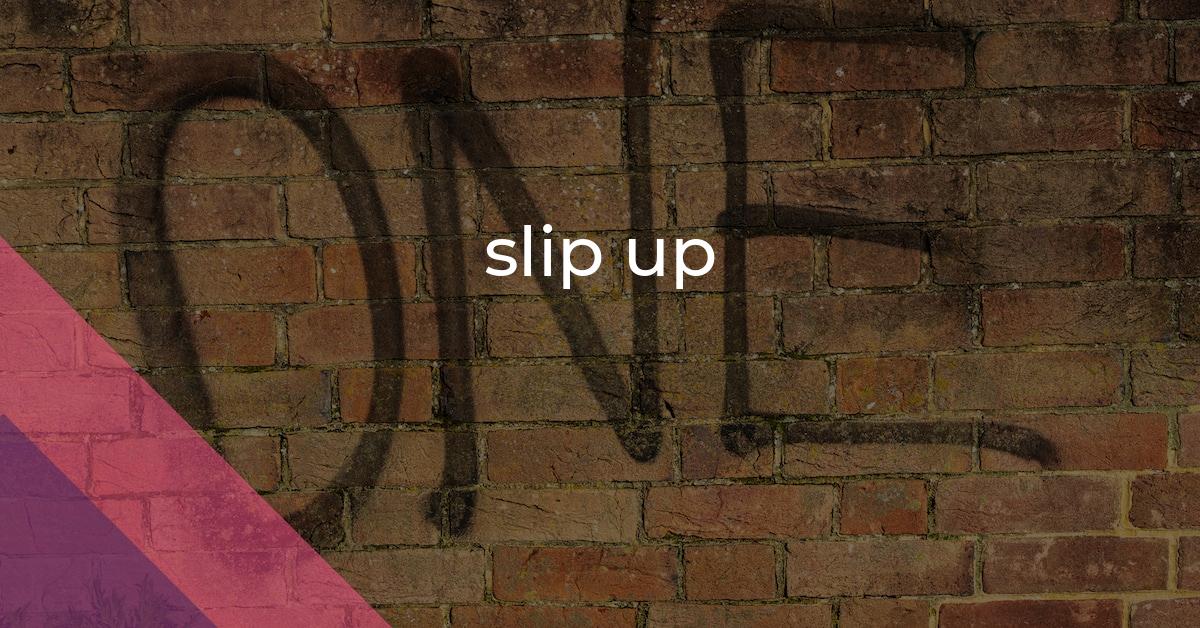slip up: Idiom Meaning and Origin
What does ‘slip up’ mean?
The idiom "slip up" means to make a mistake or error, often unintentionally, causing an oversight or blunder. It implies a momentary lapse of judgment or an uncharacteristic mistake. The phrase suggests a loss of control or balance, similar to someone slipping and falling.

Idiom Explorer
The idiom "wet the bed" means to fail or make a serious mistake, particularly when under pressure or in a high-stakes situation.
The idiom "take the fall" means to accept blame or punishment for a mistake or wrongdoing, often to protect someone else or to avoid greater consequences.
The idiom "take one's eye off the ball" means to lose focus or become distracted from an important task or goal.
The idiom "take liberties" means to act in a way that is not appropriate or allowed, often by exceeding boundaries or disregarding rules or norms.
The idiom "take ill" means to become sick or fall ill. It is commonly used to describe the act of experiencing a decline in health or catching an illness.
When someone takes a tumble, they fall down or have a sudden accident.
The idiom "take a dive" means to intentionally lose or underperform in a competition or situation, usually for personal gain or to deceive others.
The idiom "stick one's foot in one's mouth" means to say something that is embarrassing, rude, or tactless, usually unintentionally.
Hidden Origins Unveiled
The idiom "slip up" refers to making a mistake or an error, often unintentionally. It dates back to the 19th century and has its origins in the physical act of slipping, which means losing one's footing or balance and resulting in a sudden fall or mistake. This idiom has evolved over time to include errors in judgment, actions, or speech. It is a widely understood phrase that is used in various contexts, including sports, politics, and everyday conversation.
One related idiom is "slip of the tongue," which means inadvertently saying something incorrect or unintended. It is a common slip-up in speech and can happen when we are not careful with our words. This idiom highlights how even a slight slip can lead to unintended consequences, just like slipping up in our physical movements can result in a fall.
Another related idiom is "slip of the pen," which refers to making a written error or mistake while writing or typing. It emphasizes the idea that even a small mistake made while writing can have significant consequences, just as slipping up in our physical movements can lead to a fall. Both "slip of the tongue" and "slip of the pen" serve as reminders that even the smallest errors can have big impacts.
Similarly, "slip someone's mind" is an idiom that means forgetting something or failing to remember it. It highlights how our thoughts and memories can sometimes slip away from us, just like slipping up in our physical movements. Forgetting something can lead to mistakes or missed opportunities, just as slipping up can result in a fall or an error.
Another related idiom is "slip into," which means gradually adopting or becoming involved in something. It can refer to slipping into a habit, a role, or a state of mind. This idiom captures the idea of a gradual and almost unnoticeable transition, similar to slipping into a physical posture or position. It reminds us that sometimes we can unknowingly slip into certain behaviors or mindsets, leading to mistakes or unintended consequences.
Lastly, "slip through the cracks" is an idiom that means to go unnoticed or to be overlooked. It suggests that something or someone has escaped scrutiny or attention, just like something slipping through a narrow opening or crack. This idiom underscores the idea that mistakes or errors can be missed or ignored, leading to potential problems or failures.
Overall, the idiom "slip up" encompasses the concept of making a mistake or an error, whether it be in speech, writing, memory, behavior, or attention. It draws upon the notion of slipping in a physical sense to metaphorically represent a momentary loss of control or a misstep. The related idioms "slip of the tongue," "slip of the pen," "slip someone's mind," "slip into," and "slip through the cracks" further expand on different aspects of making mistakes and the consequences that may follow. These idioms remind us of the human tendency to err and face accountability for our actions.
Example usage
Examples of how the idiom "slip up" can be used in a sentence:
- She slipped up and accidentally revealed the surprise party.
- He slipped up during the interview and forgot to mention his relevant experience.
- They slipped up by not double-checking their work, causing a critical error.
More "Mistake" idioms



